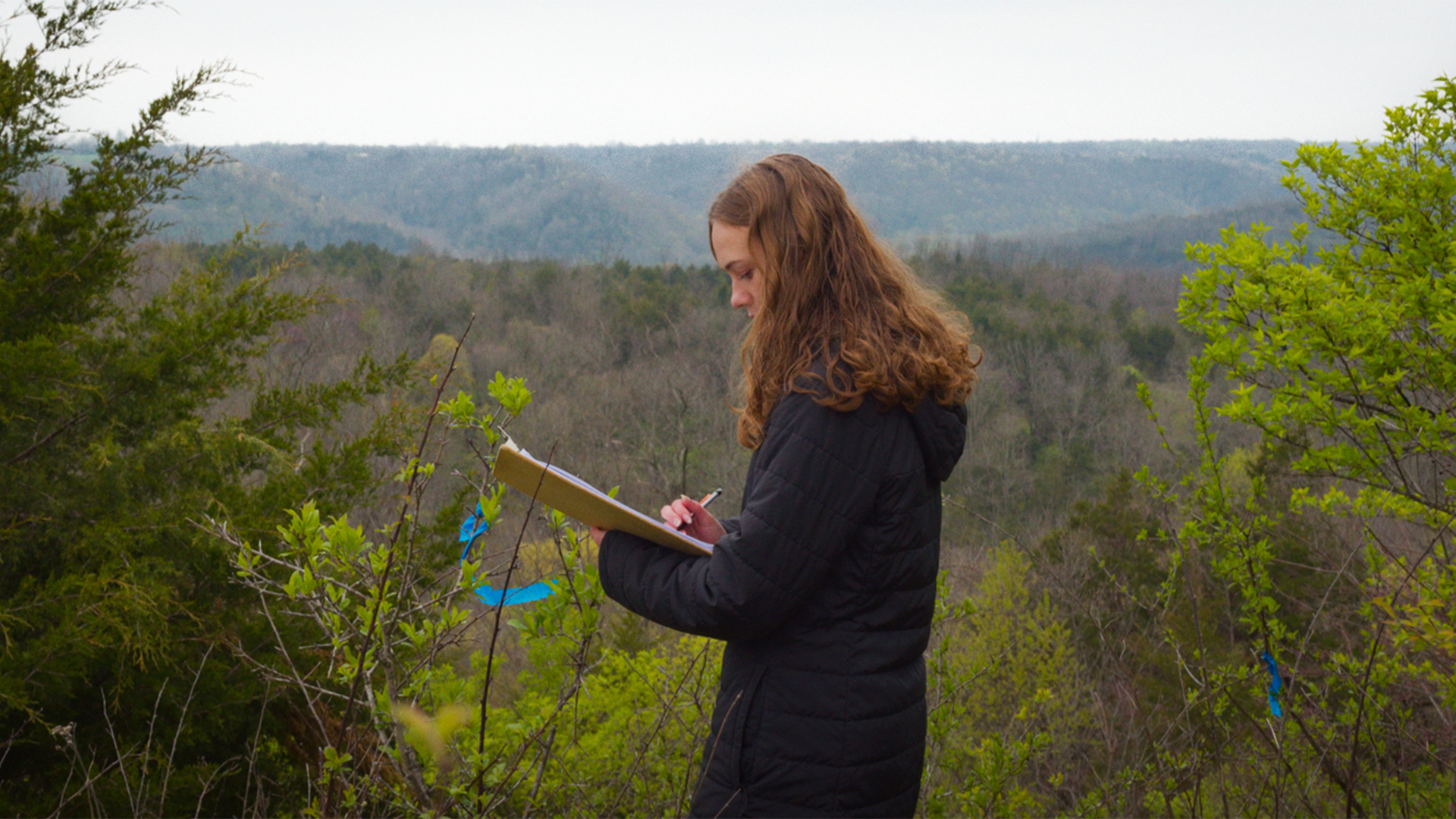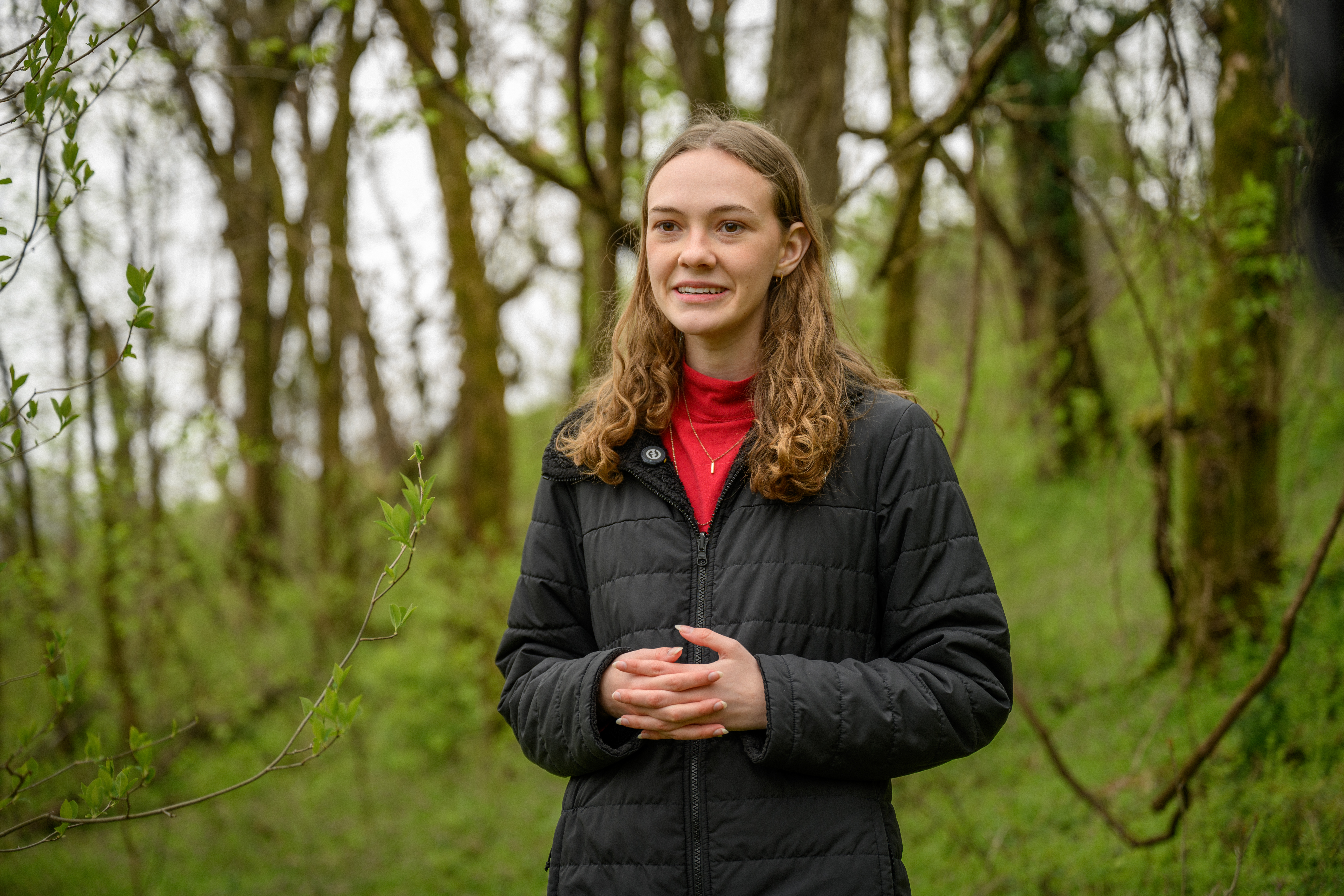From connections to conservation, student interested in wildlife career finds everything she needs at the University of Kentucky
From connections to conservation, student interested in wildlife career finds everything she needs at the University of Kentucky


As a University of Kentucky student, Callie Black has “the best of both worlds.”
From Knox County, Kentucky, Black was drawn to UK because Lexington was “a sweet spot” for someone interested in both wildlife conservation and the opportunities that a bigger city brings. Black will be a senior in the Martin-Gatton College of Agriculture, Food and Environment in the fall, majoring in natural resources and environmental science (NRES) with a wildlife specialization and biology minor.
“There are so many places in Lexington that I could reach out to,” Black said. “But on top of that, being in environmental science, you want to be close to nature. And I think Lexington is just such a good place because you can drive 30 minutes away and go to a place that feels like you're in the middle of nowhere.”

That includes Lancaster, Kentucky, where Black worked during the spring of her junior year on an undergraduate research project with John Cox, professor of wildlife and conservation biology in the Department of Forestry and Natural Resources.
Black hopes to work with mammals in the wildlife field, which is “very competitive,” so she sought out undergraduate research experience.
“I thought I needed to get an upper hand a little bit and really put out there that I'm dedicated, I've completed this and I have the experience that it takes,” Black said.
When she asked Cox about research opportunities, he said he was pursuing research about the leaf phenology, or timing of seasonal leafing, of Dahurian buckthorn, which is an invasive plant in Kentucky. The project also studies honeysuckle, another invasive, and spice bush, a plant that is native to Kentucky, as control groups.
Cox’s interest began after he purchased the property along the Kentucky River in Lancaster and noticed the extent of the buckthorn infestation.
“Years of experience with invasive species control led me to recognize its high potential to cause a lot of ecological problems. To my surprise, however, there was almost nothing published on this invasive species,” Cox said. “Some research colleagues and I formulated some research ideas to start building up our knowledge about this species, and we have since been working with a few undergrads the past couple of years to pioneer our understanding of this invader.”
Beginning in February, Black visited the research site weekly and documented how much each bud had leafed out—a zero for completely enclosed and a five for a full leaf. This allowed Black and Cox to study the timing of the leafing and compare it among the species.
“Maybe buckthorn could have some advantages that we don’t know about yet, which is what we’re trying to study,” Black said. “That way, we can figure out how to better combat the issue.”
Funding from The Bill Gatton Foundation, which was established after Carol Martin “Bill” Gatton bestowed a transformational $100 million gift to the college in 2023, has supported Black’s research, covering some of her personal costs and allowing her to focus on her studies.
“I'm putting so much work into my academics and my research,” Black said. “I'm very fortunate to receive this grant, compared to other students that may not have the capability to dedicate this much time to research that isn't funded."
Cox said this experience is a “solid foundation” for entering the workforce or pursuing further education.
“It has been great to have Callie intellectually engaged in so many ways on this project, including fun and informative conversations about fieldwork design and implementation, plant and community ecology, new avenues of research, and in the grant writing process,” Cox said. “Callie has impressively brought a strong work ethic and curiosity to bear on this project that is on par with graduate students in our research fields.”
Black said the biggest benefit of the NRES major in general and her undergraduate research specifically is “100% the connections”—both professionally and personally.
“I've made some of the best friends I've ever met, and I know I'll be friends with them for the rest of my life. I’ve gotten to really know my professors well,” Black said. "Not only that, but the knowledge I've gained just doing research has shown me a lot about what the process is, what time it takes and how dedicated you have to be.”
To learn more about undergraduate research at Martin-Gatton CAFE, visit https://students.ca.uky.edu/undergrad_research.
# # #
Writer: Bailey Vandiver, bailey.vandiver@uky.edu
University of Kentucky alum and former trustee Carol Martin “Bill” Gatton bestowed a transformational $100 million gift to the UK College of Agriculture, Food and Environment through The Bill Gatton Foundation. It is the largest gift to the university in its history.
Four pillars of The Bill Gatton Foundation's Gift are Scholarships and Student Success Initiatives; Higgins and Neyland Companion Animal Program; Capital Projects and New Initiatives Fund; and Faculty Research and Innovation Fund.
The Martin-Gatton College of Agriculture, Food and Environment is an Equal Opportunity Organization with respect to education and employment and authorization to provide research, education information and other services to individuals and institutions that provide equal opportunities for qualified persons in all aspects of institutional operations and do not discriminate on the basis of race, color, national origin, ethnic origin, religion, creed, age, physical or mental disability, veteran status, uniformed service, political belief, sex, sexual orientation, gender identity, gender expression, pregnancy, marital status, genetic information or social or economic status.
The Bill Gatton Foundation Students